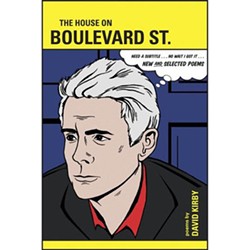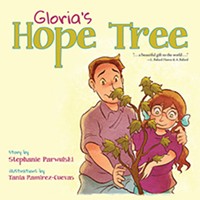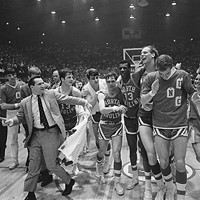Reading one of David Kirby's books is a bit like getting lucky with your seat row and number on an airplane. You'd hate to be stuck next to the chatty mom with the whiny baby, or the roly-poly businessman who takes up the entire armrest.
But bringing along a copy of Kirby's newest collection of essays, Ultra Talk: Johnny Cash, The Mafia, Shakespeare, Drum Music, St. Teresa of Avila and 17 Other Colossal Topics of Conversation, or his latest collection of new and selected poems, The House on Boulevard St., would be a bit like sitting next to your funniest and most loquacious friend. That's the one who keeps you entertained for hours because you're not exactly sure what's going on inside his head, or where he'll take you next.
In Ultra Talk, Kirby brings his readers along on a ride through his incredibly intelligent, albeit ADD-addled, psyche. "A poet and critic named Mark Halliday called my style of poetry writing 'ultra talk,' meaning it's like conversation but sort of overcaffeinated ... and full of bright, shiny objects," Kirby says by phone from his home in Tallahassee, Fla.
Kirby writes that Ultra Talk "poses a simple question -- what's good?" He builds upon the idea that something is good if "both the elite and general public embrace it and do so repeatedly over time." Kirby then tests his hypothesis by covering a range of topics: nudes at the Uffizi Gallery in Florence, Italy; his eldest son, Will, the winner of the first season of the CBS reality show Big Brother; and a production of Twelfth Night directed by Sam Mendes at London's Donmar Warehouse.
As the Robert O. Lawson Distinguished Professor at Florida State University, Kirby has taught English literature for more than 30 years, and he seamlessly blends his impressive knowledge of all things literature with more pop-culture references than a VH1 special. Kirby's essays and poems zigzag between both the high and low brows. In his essay "An Army of Chitterlings," he explains his affinity for Paris by reading Rabelais' Gargantua and Pantagruel. By contrast, other essays range from a trip to a NASCAR race in Talladega, Ala., to a discussion about the history of striptease.
Besides keeping his readers entertained with a spinning Ferris wheel of subjects, Kirby weaves his sharp wit into both his essays and, perhaps more refreshingly, his poetry. Kirby's narrative poetic style reads like a friend relaying an amusing anecdote: "At the Miro exhibit in the Centre Pompidou,/I hear a guy say to his girlfriend, 'When we get back to the hotel,/I'm going to put it to you seventeen ways from Tuesday,'/and I think, now what does that mean, exactly?/I know what 'it' is, but why that number and that day?/Also, what is it about art that makes people so happy?"
Kirby continuously tries to reinvent what a poem can mean. In Ultra Talk, he writes, "[F]or the greatest part of our common Western history, the poetry was, though quite formal, entirely unrhymed. Those were the days ... almost everybody went to a poetry reading at least once a week. They called it church."
One look at Kirby's poems shows that he is decidedly against traditional guidelines of what a poem should be, instead using his poetry to communicate with an audience. "Poetry has moved out horizontally," he says. "My students are always saying to me, 'Can I do this in a poem, can I do that in a poem?' And the answer is, you can do what you want, as long as it works.
"It's trial and error," he continues. "It's not Big Brother, but on a low level, it's showbiz, and if the audience doesn't like it, you need to be doing something else."
Latest in Books
Calendar
-

NEW WINDOW GALLERY-Pat Rhea-ACRYLIC PAINTINGS-April 05-30 2024 VALDESE, NC 28690 @ New Window Gallery/Play It Again Records
- Through April 30, 12 p.m.
-
Derek Hough - Symphony Of Dance @ Ovens Auditorium
-

"Blood Residue Analysis of Paleoamerican Stone Tools in the Carolinas" @ Native American Studies Center
- Fri., April 26, 12-1 p.m.
-

ARTS RENAISSANCE, a GALA supporting the ARTS in South Carolina @ the Columbia Museum of ART
-
 The Piano Guys @ Ovens Auditorium
The Piano Guys @ Ovens Auditorium











